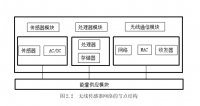证据理论在无线传感器网络决策融合中的应用研究

证据理论在无线传感器网络决策融合中的应用研究(任务书,开题报告,论文11500字)
摘 要
无线传感器网络(Wireless Sensor Network, WSN),一种由大量传感器组成且能够进行无线通信的无线网络,在现代生活中得到了愈来愈广泛的应用。无线传感器网络能够对监测区域内观测者感兴趣的信息实施实时监测、感知以及采集,并对采集到的信息进行预处理,最后通过无线通信的方式发送给观测者。
作为多传感器数据融合中的经典算法,D-S证据理论一直是研究热门。本文深入研究并探讨了如何将证据理论与无线传感器网络决策融合相互结合。在分析对比了集中式融合方式和分布式融合方式的优缺点后,本文中的决策融合问题都将基于分布式融合方式展开。无线传感器网络决策融合是各个传感器先对所收集的的信息进行局部决策,随后由融合中心对这些局部决策进行融合,并作出对某个目标或某个事件的决策的检测技术。正是由于D-S证据理论在处理不确定信息方面的优势,使其成为多传感器数据融合中最常应用到的算法。
本文首先对无线传感器决策融合展开了理论阐述,详细分析了决策融合原理、融合方式和模型等。然后,对D-S证据理论的基本理论展开说明以及对合成规则进行分析。对于D-S证据理论在决策融合的基本算法进行分析讨论,并对D-S证据理论在无线传感器决策融合系统中处理分析时凸显的信息方面问题进行了分析。主要研究内容有证据理论的优缺点、信息源独立性问题和证据冲突问题等问题。并且针对严重证据冲突时的融合提出相应的改进方法,提高其融合性能。
关键词:无线传感器网络,决策融合,D-S证据理论
ABSTRACT
Wireless Sensor Network is a wireless network by a large number of stationary or moving sensor to self-organization and multi-hop manner constituted,which is able real-time monitor, sense and collect node deployment area of interest in the viewer's perception of the object of all kinds of information(such as light intensity, temperature, humidity, noise and harmful gas concentrations and other physical phenomena),and after processing the information obtained, it will be sent to the observer through a wireless network eventually.
In this paper, we discuss a conventional multi-sensor data fusion of classical algorithm-Evidence Theory in Wireless Sensor Network Based on Decision Fusion.,which is based on distributed sensor fusion approach network decision fusion problem.Wireless sensor network (WSN) decision fusion is a key problem of sensor network data fusion.Decision fusion is a kind of sensor network from all sensor information fusion, sensor network and to make decisions on a target or an event detection technology.D-S evidence theory for uncertain information expression and synthesis provides a natural and powerful fusion method, so the it application in WSN decision fusion has great significance to improve the performance of WSN.
First of all, explain the wireless sensor decisions theoretically, and then analyze decision fusion principles, advantages and disadvantages, and models.After that, illustrate the basic theory of D-S theory and expand a description of the synthesis rule analysis. Evidence for the theory is discussed in-depth analysis of the basic application model decision fusion, D-S theory and decision-making in the wireless sensor fusion system to information problems highlighted were analyzed processing analysis.The main contents are the advantages and disadvantages of D-S theory, sources of information and evidence on the independence of conflicts and other issues, and propose improvements to improve and enhance their integration performance.
Key Words:Wireless Sensor Network, Decision fusion,D-S theory
[版权所有:http://DOC163.com]


目录
第 1 章 绪 论 1
1.1课题研究的背景和意义 1
1.2 国内外研究现状 1
1.3课题研究内容 2
第2章 无线传感器网络及决策融合概述 3
2.1无线传感器网络概述 3
2.2无线传感器网络的体系结构 3
2.2.1 网络结构 3
2.2.1 节点组成 3
2.3无线传感器网络的特点 4
2.3无线传感器网络决策融合 5 [版权所有:http://DOC163.com]
2.3.1决策融合 5
2.3.2决策融合方式 5
第3章 D-S证据理论 7
3.1 D-S证据理论概述 7
3.2 D-S证据理论的基本理论 7
3.2.1 识别框架 7
3.2.2 基本信任分配函数 8
3.2.3 信任函数 9
3.2.4 似然函数 9
3.3 D-S 合成规则及其基本性质 10
3.3.1 D-S 合成规则 10
3.3.2 D-S证据理论合成规则的基本性质 11
第4章 应用过程中D-S证据理论出现的问题及改进 13
4.1证据冲突问题 13
4.2 D-S证据理论的改进 13
4.3 D-S证据理论存在的其他问题 15
4.3.1 信息源独立性问题 15
4.3.2 基本概率指派问题 15
4.3.3 计算量问题 15
第5章D-S证据理论在WSN决策融合中的应用实例 16
[来源:http://Doc163.com]
5.1应用实例 16
5.2仿真及仿真结果 17
第6章 总结与展望 19
参考文献 20
致谢 22 [版权所有:http://DOC163.com]
